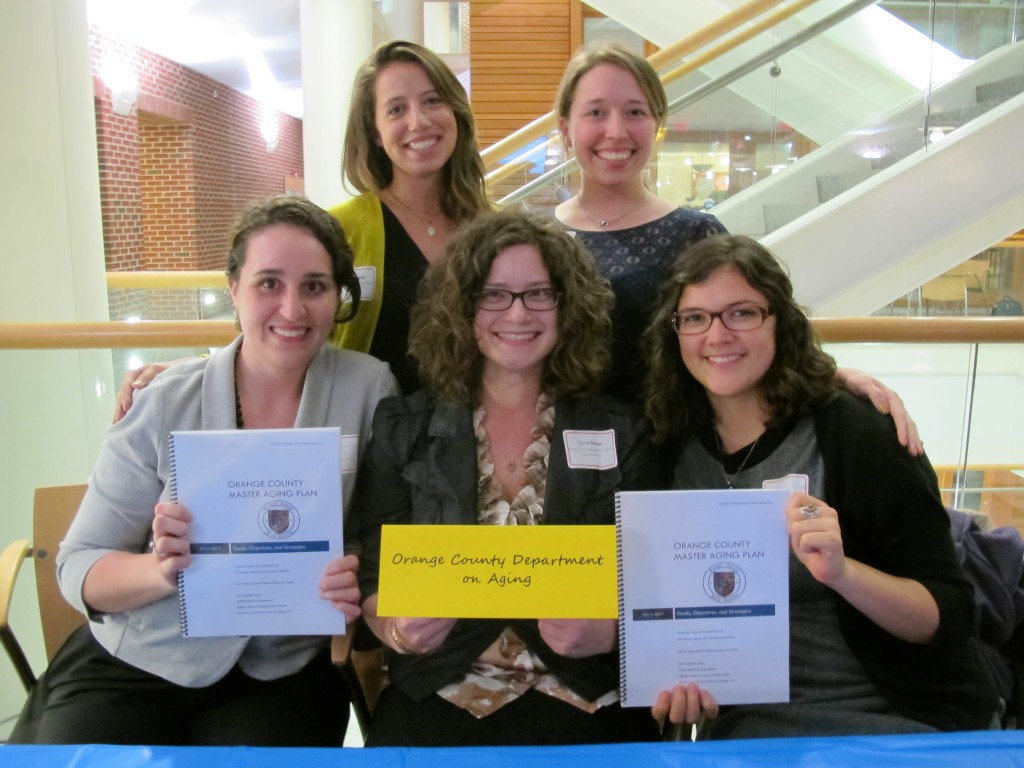Partnering with communities
May 4, 2015
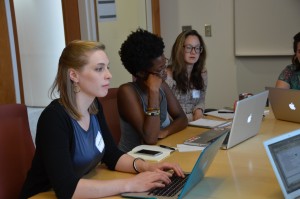
Caitlyn Snider, Adébukola Oni and Hyun Namkoong meet with potential capstone community partners. (Photo by Branson Moore)
Throughout North Carolina, Master of Public Health students from the UNC Gillings School of Global Public Health are hard at work in communities — designing, reviewing and improving community-based programs to improve health outcomes statewide. They’re doing it for course credit — and they’re loving the learning process.
Since 2009, instead of writing lengthy theses, health behavior master’s students participate in the capstone program, an initiative that embeds them within a community project, giving them opportunity to gather new skills while they apply in their neighborhoods what they’ve learned in the classroom. The capstone course was the result of a comprehensive review of the Master of Public Health program, led by Laura Linnan, ScD, professor of health behavior at the Gillings School.
Now in its sixth year, capstone accomplishes something its community partners had long wanted, says Megan Landfried, MPH, capstone program manager and health behavior lecturer.
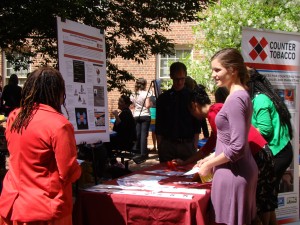
Students in spring 2013 display their capstone accomplishments at a poster exhibition. (Photo by Branson Moore)
“A program evaluation revealed that many stakeholders were ready for a new form of field training,” Landfried says. “We really wanted to strike an optimal balance between student learning and service to our community partners.”
Landfried, who participated as a student in Action-Oriented Community Diagnosis, a prior iteration of the year-long field experience, says the current program affects real change in communities while preparing students for their own careers. That students work on projects proposed by community partners ensures that their efforts truly benefit the communities in which they work.
Each year, capstone invites 15 to 17 community partners to the School for a “pitch day,” when program leaders present their project ideas to students. Students rank the five programs in which they are most interested, and capstone leaders assign between four and six students to each of 10-12 selected projects. On average, 80 percent of students are assigned to their first choices.
Student Impact
.
According to Landfried, students spend about 7.5 hours each week with their projects, working alongside program leaders and learning from these real-world mentors.
For example, PORCH (porchnc.org), a Chapel Hill-based, all-volunteer, hunger-relief organization, has worked with capstone to evaluate the efficacy of its food distribution and referral process, says program founder Debbie Horowitz. Without capstone students, the group could not have obtained that information.
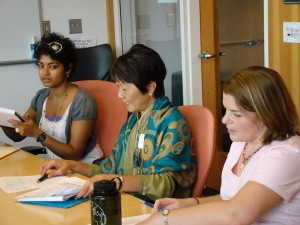
Dr. Geni Eng (center), professor and capstone adviser, attends a planning session with students and their community partners. (Photo by Linda Kastleman)
“The students have provided us with a lot of data that we would have had to do without otherwise,” Horowitz says. “Are we helping the right people? Is the food we provide being used? Are we providing enough? As an all-volunteer organization, we just don’t have the time and expertise to go after that research.”
Based on capstone work, for example, PORCH leaders learned that 50 percent of the Hispanic families served by the organization don’t use peanut butter. That’s useful information, Horowitz says, because historically, volunteers have worried about not having enough of what they considered a basic nutritious food for every family. Now, they can distribute the product more efficiently.
Next year, she says, she hopes capstone students will help redesign PORCH’s referral process, improving communication and making it more seamless for social workers to help connect families to the service.
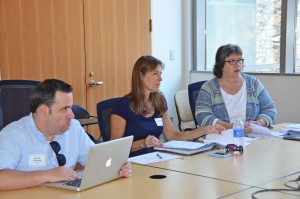
Dr. Laura Linnan, professor and adviser (far right) listens to a community partner describe a project and invite capstone students to be part of it. (Photo by Linda Kastleman)
Safe Teens Think First, a program based in Cleveland County (N.C.), engaged capstone students to re-invigorate their efforts to teach safe driving skills to teens. Sharon Schiro, PhD, program leader and UNC assistant professor of general and acute care surgery at the UNC School of Medicine, says the program initially presented lectures about driving to between 30 and 60 teens.
Being closer to the young drivers’ ages (15 and 16 years old), she says, capstone students were able to identify ways to keep teens more engaged. Not only were the teens divided into smaller groups for direct interaction, but they also were given more activities.
In the future, Schiro says, she hopes capstone students will help expand the program and take Safe Teens Think First beyond Cleveland County to the rest of North Carolina.
Program benefits
.
Although capstone is the culminating academic element of the Master of Public Health degree, its benefits are far-reaching, both for student and community partner.
“For the community organizations, capstone students offer a fresh perspective on how each program runs,” Horowitz says. “It certainly forces us to change and improve. When you have people asking questions and thinking outside the box, it will inform the changes that we make to our own programs.”
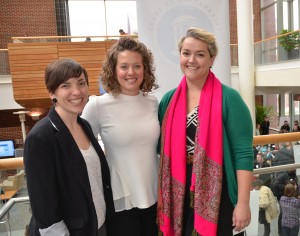
Meg Landfried (left) poses with capstone teaching assistants Melissa Cox (center) and Christine Agnew-Brune during a final presentation of team projects. (Photo by Linda Kastleman)
Master’s candidates also benefit from the capstone experience. Although time spent in Gillings School classrooms gives students a solid foundation for meeting public health needs, working with capstone partners gives them first-hand experience and a taste of what to expect in their future jobs.
An added benefit, Schiro says, is that the program exposes students to potential employers and provides students with work references outside academia.
“Capstone is a fusion of academic instruction and real-world endeavors that prepares MPH candidates to better meet the public health needs they will encounter in their careers,” Landfried says. “The program is a unique opportunity to carry out important field work while having a wonderful, supportive safety net.”
—Whitney L.J. Howell
2012 capstone team won state award for work on aging
In 2012, a Gillings School capstone team won the Marvin Collins Planning Award for Graduate Student Project Planning, presented by the North Carolina chapter of the American Planning Association.
Team members Phoebe Goldberg, Marcia Perritt, Laura Major, Rebecca Woodruff and Hannah Prentice-Dunn were given the award for their work with N.C. county government.
“These capstone students were key to the development of the 2012-2017 Orange County Master Aging Plan,” says Janice Tyler, director of the Orange County Department on Aging. “They provided the expertise to take our strategic planning to a new level. They applied skills they were learning in the classroom to this community-based planning effort. The bottom line is we couldn’t have done it without them!”
Meg Landfried, MPH, capstone program manager, says the students demonstrated unwavering commitment to their project. “Their work undoubtedly will have positive outcomes for the Department on Aging and older adults in Orange County for years to come,” she says.
Carolina Public Health is a publication of the University of North Carolina at Chapel Hill Gillings School of Global Public Health. To view previous issues, please visit sph.unc.edu/cph.

